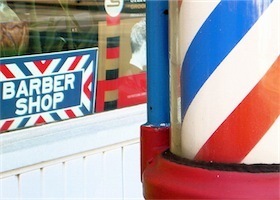Barber Licensing Rules Harm Prisoner Re-entry

Nobody comes out and says "I want to establish an occupational licensing regime for my profession in order to create an arbitrary barrier to entry" but the system works, in practice, to create arbitrary barriers to entry. Consequently, there's a need to find barriers that don't seem totally arbitrary, and one way to do this is to bar ex-offenders from practicing certain trades:
In 1997, Kyrone Pinkston's then-wife accused him of sexually assaulting her. He was charged, pleaded guilty and was sentenced to probation, but after failing to comply with the rules of his supervision, he was sentenced to 10 years in prison. A barber by profession, Pinkston could not renew his license in prison, and it had expired by the time he was released in 2008. When he reapplied, his ex-wife offered her support, writing that he had grown into "a remarkable man and father." A barbershop owner confirmed that Pinkston would have a job when he reclaimed his license. But the agency that licenses barbers, the Texas Department of Licensing and Regulation, rejected Pinkston's application. When he appealed, a state administrative law judge agreed that permitting Pinkston to cut hair presented an unacceptable threat to the public.
I have no particular brief for Kyrone Pinkston notwithstanding the apparent forgiveness he's gotten from his wife. But the point is that holding down a legal job is exactly what we want people to do after they get out of prison. Locking ex-cons out of labor market opportunities has minimal deterrent impact on crime and it's counterproductive from the standpoint of incapacitation. And there's no reason to think the market here will fail. A barbershop owner has no reason to employ a barber who he thinks will do a bad job of cutting hair.


Matthew Yglesias's Blog
- Matthew Yglesias's profile
- 72 followers



